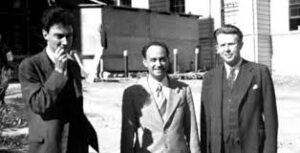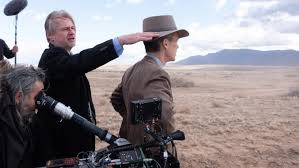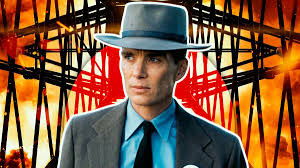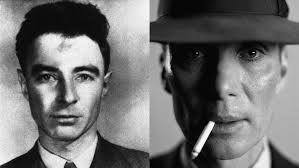Oppenheimer Full Movie You Must watch And Enjoy
Introduction
Cinema has always been fascinated with larger-than-life figures, those whose choices changed the direction of history and shaped the modern world.
This epic film goes far beyond the boundaries of a traditional biopic. It is not merely about science, not only about war, and not simply about politics. Instead, it is a meditation on genius, ambition, morality, and the heavy burden of consequence. From its grand visuals to its intimate emotional moments, Oppenheimer stands as one of the most ambitious cinematic projects of the decade.

In this spoiler-free exploration, we’ll dive into every aspect of the film — its storyline, themes, cast performances, direction, technical brilliance, audience response, and cultural impact. Whether you’ve seen the film or are considering watching it, this article will guide you through the richness of what Oppenheimer has to offer.
The Story at a Glance
At its surface, Oppenheimer tells the story of a brilliant scientist whose work altered the course of history. We follow J. Robert Oppenheimer through his academic life, his intellectual achievements, and his leadership in one of the most secretive and consequential scientific projects ever undertaken — the Manhattan Project.
Yet the movie is not just about the making of an atomic weapon. It is about the mind of the man behind it. The story unfolds through layered perspectives, showing how Oppenheimer was both celebrated as a genius and criticized for the catastrophic consequences of his work. His personal relationships, moral dilemmas, and the political tensions of his era are all woven into a gripping narrative that never feels like a dry history lesson.
Christopher Nolan structures the film in a way that constantly keeps viewers engaged. We are not simply told what happened; we experience it through Oppenheimer’s eyes, his anxieties, and his struggles. By the end, we understand that this is less about the mechanics of building a weapon and more about the psychological weight of carrying the knowledge that changed humanity forever.

Themes That Define the Film
1. The Burden of Genius
Oppenheimer is portrayed as a man of extraordinary intellect, yet with that brilliance comes an equally heavy burden. The film examines how genius is both a gift and a curse. His ability to see possibilities beyond the ordinary pushes science forward, but it also places him at the center of moral questions no one was prepared to answer.
2. Morality and Responsibility
At the heart of the film is a question that still resonates today: when scientific breakthroughs are capable of massive destruction, who bears responsibility? The scientist who conceives the idea? The leaders who order its use? Or society itself, which demands security at any cost? Nolan ensures these questions echo throughout the narrative without providing simplistic answers.

3. Power and Politics
Beyond the laboratories and equations, the film reveals how politics shapes the fate of individuals. Oppenheimer’s scientific achievement brought him fame, but it also placed him under scrutiny. His ideas and personal associations made him a target in a world dominated by fear, suspicion, and political agendas.
4. Isolation and Inner Conflict
Despite being surrounded by some of the greatest minds of his generation, Oppenheimer is often depicted as alone. His brilliance separates him, his decisions isolate him, and his own conscience creates battles within. This theme of solitude runs throughout the film, reminding viewers that history’s greatest moments often come with personal sacrifices.
5. The Human Cost of Progress
The film does not glorify scientific advancement as an unqualified good. Instead, it highlights the human cost that comes with progress. Oppenheimer asks whether innovation is always worth the price when its outcomes change lives forever, often in irreversible ways.
Performances That Bring History to Life
Cillian Murphy as J. Robert Oppenheimer
Cillian Murphy delivers a performance that is both haunting and mesmerizing. He embodies the scientist with quiet intensity, capturing his intelligence, vulnerability, and inner turmoil. Murphy’s portrayal is layered, showing Oppenheimer as a man who is both visionary and fragile, confident in his intellect yet uncertain about the consequences of his choices.

Robert Downey Jr.
In one of his most transformative roles, Robert Downey Jr. steps away from the superhero persona he became famous for and delivers a performance grounded in nuance and authority. His role adds complexity to the political layers of the film, showing how power and ambition can shape narratives around historical figures.
Emily Blunt
Emily Blunt brings strength and emotional depth to her role as Oppenheimer’s wife, Kitty. Her performance highlights the toll that Oppenheimer’s career and choices take on those closest to him. She is both supportive and critical, embodying the voice of the personal world that constantly collides with the professional.
Supporting Cast
The ensemble cast, including Matt Damon, Florence Pugh, and others, contributes to the film’s richness. Each role, no matter how small, feels vital in building the world around Oppenheimer. The performances ensure that this is not a film carried by one actor but a collaborative effort that reflects the magnitude of its story.
Nolan’s Direction: A Master at Work
Christopher Nolan has built his reputation on films that blend intelligence with spectacle. With Oppenheimer, he pushes his craft even further. The movie is grand in scale yet intimate in emotion. Nolan avoids turning the story into a standard biopic. Instead, he constructs a cinematic experience that feels urgent, immersive, and deeply human.

Nolan’s decision to use practical effects wherever possible adds authenticity. Even though the film deals with monumental scientific and political events, the focus remains on the human perspective. His nonlinear storytelling style, combined with meticulous attention to detail, creates an experience that is both intellectually stimulating and emotionally moving.
Visuals and Cinematography
Shot with IMAX cameras and framed with breathtaking precision, Oppenheimer is a visual masterpiece. The cinematography captures vast landscapes, tense interiors, and intimate close-ups with equal brilliance.
The visual design mirrors Oppenheimer’s psychological state. Moments of clarity are depicted with crisp detail, while moments of inner conflict are framed with shadows and contrasts. The visual language of the film becomes a character in itself, guiding the audience through the emotional and intellectual journey.
Sound and Music
Sound plays an essential role in Oppenheimer. The film uses silence and noise with equal power, building tension and reflecting the magnitude of the subject. The sound design ensures that viewers feel the weight of the decisions being made, not just see them on screen.
The score, composed with intensity and precision, enhances the film’s impact. It underlines moments of triumph, despair, and moral conflict without overwhelming the narrative. Music in Oppenheimer is not background — it is an active force that shapes the viewer’s emotional response.

Editing and Structure
Nolan’s editing style ensures that the film flows seamlessly despite its complex subject matter. The nonlinear structure, shifting between different timelines and perspectives, demands attention from the viewer but rewards it with a deeper understanding of Oppenheimer’s life.
Instead of a straightforward chronological approach, the editing mirrors the way memory and history work: fragmented, overlapping, and layered. This makes the film not just a recounting of events but a reflection of how those events are remembered and interpreted.
Audience Reception
Oppenheimer has been embraced by audiences worldwide. Viewers praise it for being both intellectually challenging and emotionally moving. Many appreciate the fact that the film does not rely on action or spectacle alone but instead engages the mind and heart.
For general audiences, the movie offers an opportunity to learn about a pivotal figure in history in a way that feels cinematic rather than academic. For history enthusiasts, it provides insight into the human side of a scientific milestone. For fans of Nolan, it confirms his status as one of the most ambitious filmmakers of our time.
Critical Response
Critics have hailed Oppenheimer as a masterpiece. The film has been praised for its performances, direction, cinematography, and ability to blend historical accuracy with cinematic artistry. While some note that its complexity may challenge casual viewers, most agree that it is a landmark film that will be studied for years to come.
Awards bodies have recognized the film across categories, from acting to technical excellence. Its cultural relevance ensures that it will remain in conversations long after its theatrical run.

Cultural Impact
Beyond the theater, Oppenheimer sparks discussions about science, ethics, and responsibility. It reminds modern audiences that the issues Oppenheimer faced are not confined to the past. In an age of artificial intelligence, biotechnology, and other rapidly advancing fields, the question of how we use knowledge responsibly is as urgent as ever.
The film also revives interest in historical debates, encouraging viewers to read more about the Manhattan Project, World War II, and the Cold War. It acts as a bridge between history and the present, showing that the moral dilemmas of yesterday continue to echo today.
Lessons from Oppenheimer
Knowledge is Power, but Also a Burden – Scientific discoveries can change the world, but they also place immense responsibility on those who make them.
Ethics Cannot Be Ignored – Progress without morality can lead to devastation.
Genius and Isolation Often Intertwine – The most brilliant minds are often the most isolated, carrying burdens few others can understand.
Politics Shapes Science – No discovery exists in isolation; it is always influenced by power, agendas, and global tensions.
History Repeats in New Forms – The dilemmas of Oppenheimer’s time continue in new scientific frontiers today.
Conclusion
Oppenheimer is more than a movie. It is an experience that forces viewers to confront the complexities of history, science, and human ambition. It stands as a cinematic achievement that blends powerful performances, visionary direction, and thought-provoking themes.
Christopher Nolan has crafted a film that will be remembered not only as a highlight of his career but also as a landmark in modern cinema. For anyone seeking a movie that challenges the mind, stirs the heart, and lingers long after the credits roll, Oppenheimer is essential viewing.
By the time the film ends, one truth becomes clear: the story of Oppenheimer is not just about the past. It is about the eternal struggle between knowledge and responsibility, between ambition and consequence, between the brilliance of creation and the shadows it leaves behind.
Frequently Asked Questions (FAQs) about Oppenheimer
Q1. What is the movie Oppenheimer about?
A spoiler-free answer: The film explores the life of J. Robert Oppenheimer, the scientist known as the father of the atomic age. It focuses on his genius, his moral struggles, and the historical significance of his work, told through Christopher Nolan’s powerful direction.
Q2. Is Oppenheimer based on a true story?
Yes. The film is inspired by the real life of J. Robert Oppenheimer and the events surrounding the Manhattan Project, though it presents them in a cinematic style.
Q3. Who plays Oppenheimer in the movie?
Cillian Murphy takes on the role of J. Robert Oppenheimer, delivering one of his most praised performances to date.
Q4. Is Oppenheimer a science film or a drama?
The movie blends both. While it covers scientific breakthroughs, it is primarily a dramatic story about human ambition, morality, and responsibility.
Q5. Do I need to know history before watching Oppenheimer?
Not at all. The film is designed for both history enthusiasts and general audiences. It provides enough context to understand the story without prior knowledge.
Q6. Is Oppenheimer suitable for all audiences?
The film is intense and thought-provoking, best suited for mature viewers who can engage with its themes of war, science, and morality.
Q7. What makes Christopher Nolan’s direction in Oppenheimer special?
Nolan combines IMAX visuals, practical effects, nonlinear storytelling, and a focus on the psychological depth of characters to create a unique cinematic experience.
Q8. How long is the movie Oppenheimer?
The film has an extended runtime, allowing it to deeply explore Oppenheimer’s life and the historical context around him.
Q9. Does Oppenheimer focus only on science?
No. The film goes beyond science, exploring politics, personal relationships, and the emotional consequences of Oppenheimer’s work.
Q10. Why should I watch Oppenheimer?
Because it is more than a historical film — it is a cinematic masterpiece that blends visuals, performances, and storytelling into an unforgettable experience.
